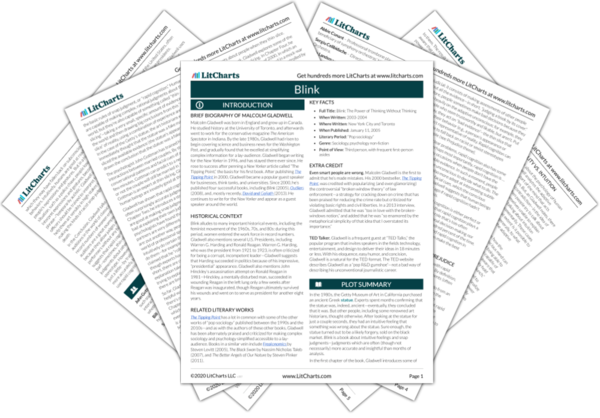Welcome to the LitCharts study guide on Malcolm Gladwell's Blink. Created by the original team behind SparkNotes, LitCharts are the world's best literature guides.
Blink: Introduction
Blink: Plot Summary
Blink: Detailed Summary & Analysis
Blink: Themes
Blink: Quotes
Blink: Characters
Blink: Symbols
Blink: Theme Wheel
Brief Biography of Malcolm Gladwell

Historical Context of Blink
Other Books Related to Blink
Key Facts about Blink
- Full Title: Blink: The Power of Thinking Without Thinking
- When Written: 2003-2004
- Where Written: New York City and Toronto
- When Published: January 11, 2005
- Literary Period: “Pop sociology”
- Genre: Sociology, psychology non-fiction
- Point of View: Third person, with frequent first-person asides
Extra Credit for Blink
Even smart people are wrong. Malcolm Gladwell is the first to admit that he’s made mistakes. His 2000 bestseller, The Tipping Point, was credited with popularizing (and even glamorizing) the controversial “broken window theory” of law enforcement—a strategy for cracking down on crime that has been praised for reducing the crime rate but criticized for violating basic rights and civil liberties. In a 2013 interview, Gladwell admitted that he was “too in love with the broken-windows notion,” and added that he was “so enamored by the metaphorical simplicity of that idea that I overstated its importance.”
TED Talker. Gladwell is a frequent guest at “TED Talks,” the popular program that invites speakers in the fields technology, entertainment, and design to deliver their ideas in 18 minutes or less. With his eloquence, easy humor, and concision, Gladwell is a natural for the TED format. The TED website describes Gladwell as a “pop R&D gumshoe”—not a bad way of describing his unconventional journalistic career.







